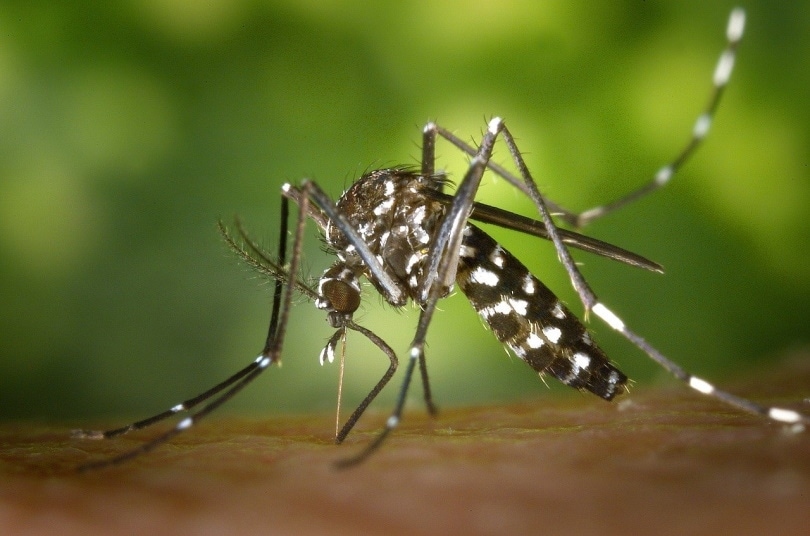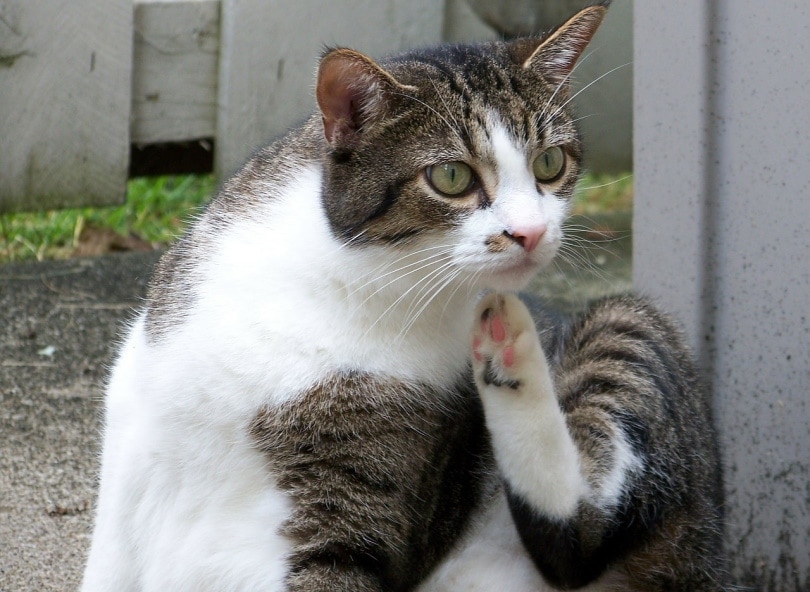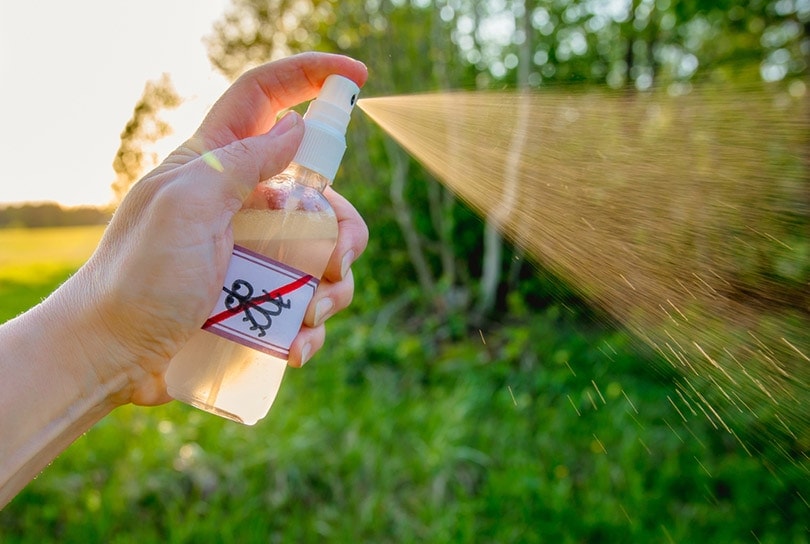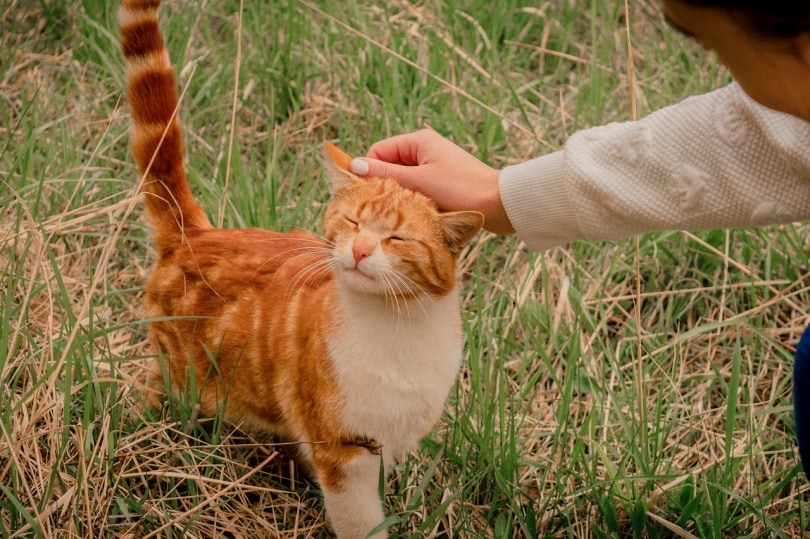Do Mosquitoes Bite Cats? Science-Based Facts & FAQ

Updated on

Mosquitoes play an essential role in our ecosystem. Indeed, they are the favorite food of fish, amphibians, birds, bats, dragonflies, and many others. But that doesn’t prevent them from being highly infuriating little creatures who love to ruin our barbecues on beautiful summer evenings. We are indeed all prone to the bites of these nasty insects, but what about our precious pet felines?
Unfortunately, cats are also not immune to mosquito bites. Indeed, mosquitoes can bite cats and transmit diseases to them. However, you can help your feline fight against the (sometimes) dangerous mosquito bites. Let’s find out how.
What Diseases Can Mosquitoes Transmit to Cats?

Insects can transmit many diseases to cats (and several other mammals). The most prominent are those transmitted by mosquitoes, sandflies, fleas, and ticks.
Generally, mosquito bites, while irritating, are harmless to cats. Besides, they usually go unnoticed. However, some mosquitoes carry parasites and can inoculate diseases such as:
Eosinophilic dermatitis: Studies have shown that some cats may have hypersensitivity to mosquito bites, called type I hypersensitivity. This condition occurs when the cat’s immune system has a substantial reaction to a bite. This can cause serious skin problems and possibly lead to a dangerous allergic reaction.
If your cat exhibits this hypersensitivity, they will develop red, inflamed lesions around the bite. So, if you notice these lesions on your pet’s skin, take them to your vet without delay so that they can treat the infected areas with appropriate medication.
Dirofilaria immitis: Dirofilaria immitis, or heartworm, is a parasite transmitted by mosquitoes and lives in the hearts of affected cats or dogs. It gets lodged in the heart and possibly the pulmonary arteries of the cat, causing a disease called heartworm. As the incubation period can be up to several years, the link to a mosquito bite can be difficult to make. This example highlights the importance of using antiparasitics on cats, such as shampoos and pest control solutions.
Signs of heartworm disease include weight loss, fatigue, loss of appetite, difficulty breathing, and excessive shortness of breath. In some severe cases, heartworm disease can be fatal.
West Nile virus (WNV): WNV is a virus transmitted by mosquitoes with a broad host range, including birds and mammals. Cats can also get infected if they eat infected small mammals and birds.
However, most infections are mild. But, if your pet shows signs of fever, depression, weakness or muscle spasms, seizures, or paralysis, see your vet right away. This veterinarian will assess your cat’s condition and give him the appropriate treatment.
Besides, this virus does not only affect cats; it is also one of the main causes of mosquito-borne diseases in the United States. Fortunately, although there are no vaccines or treatments for this virus, it doesn’t cause serious complications in humans frequently. In addition, it is improbable that your cat can transmit this virus to you.
How Do You Know if Your Cat Has Been Bitten by a Mosquito?
Observe Your Cat’s Behavior
Mosquitoes usually bite in areas where the cat’s hair is thinner. The bite will be very itchy and form a circle with reddish edges on the skin; it can also become very swollen.
If your cat starts rubbing its paw or head, biting, licking, or you notice swelling on its skin, it could very well be due to a bite. Pay attention to other unusual signs, too: a meow can have many meanings and could be a message from your kitty.

Keep an Eye on the Infected Area
Typically, mosquito bites remain mild. You should, however, monitor your cat for possible complications, although these are quite rare. For example, if the stung area becomes redder, swollen, or does not heal, you need to go to your vet. Some parts of your cat’s body are also considered at higher risk, such as the muzzle and ears.
Besides, you will need to react quickly if your cat has been bitten in the mouth or throat or if swelling appears in these areas after a bite, as they may create breathing problems.
The same is true if your cat has an allergic reaction or has had multiple bites. Signs like difficulty breathing, excessive salivation, dizziness, vomiting, or diarrhea should alert you.
If this happens, you will need to get to your vet very quickly.
 Top 5 Ways to Protect Your Cat From Mosquito Bites
Top 5 Ways to Protect Your Cat From Mosquito Bites
Just as mosquitoes bite humans, they can bite cats, too. As with humans, mosquito bites are nasty; they irritate the skin but can also infect your pet with serious illnesses. Fortunately, there are several ways to prevent mosquito bites.
1. Protect Your Cat From Mosquito Bites With Repellents
Consult your veterinarian to choose safe options to reduce the number of mosquito bites in your cat. Some products are available as a spray and should be applied to your cat before each outing (and reapplied every few hours).

Note: Never use a mosquito repellent made for humans. Many of them contain ingredients that are safe for you but potentially harmful to animals.
2. Avoid Letting Your Cat Out When Mosquitoes Are Most Active
Your cat will probably resent you, but it’s for his own good. Mosquitoes are most active at dawn and sunset; that’s why it’s best to avoid letting your kitty out during these times. This will prevent him from getting bitten excessively.
3. Reduce the Number of Mosquitoes in Your Garden
Keep mosquitoes from multiplying in your garden by adding natural repellents like citronella candles. Also, avoid areas of standing water in your backyard: dog bowls, empty flower pots, birdbaths, ponds, children’s wading pools, and corners of the garden where water collects. Those are all places that attract mosquitoes.

4. Examine the Entry Points to Your Home
Do not make it easy for mosquitoes to enter your home. Identify snags in screened doors and windows and replace or repair them if necessary.
5. Prevent Heartworm Infection With Regular Treatment
Although these preventative measures will reduce the risk of mosquito bites in your cat, it is almost impossible to reduce them to zero. This is why giving your cat heartworm medication regularly is essential for maintaining his health and safety. Ask your veterinarian for the recommended treatment method to prevent a potentially dangerous bite in your pet.

Final Thoughts
Mosquito bites drive us all crazy. Unfortunately, our four-legged companions are not immune to these annoying insect bites either. Fortunately, you can help protect your felines from mosquito bites by taking a few simple precautions and using the right mosquito repellants.
Featured Image Credit: WikiImages, Pixabay


 Top 5 Ways to Protect Your Cat From Mosquito Bites
Top 5 Ways to Protect Your Cat From Mosquito Bites







